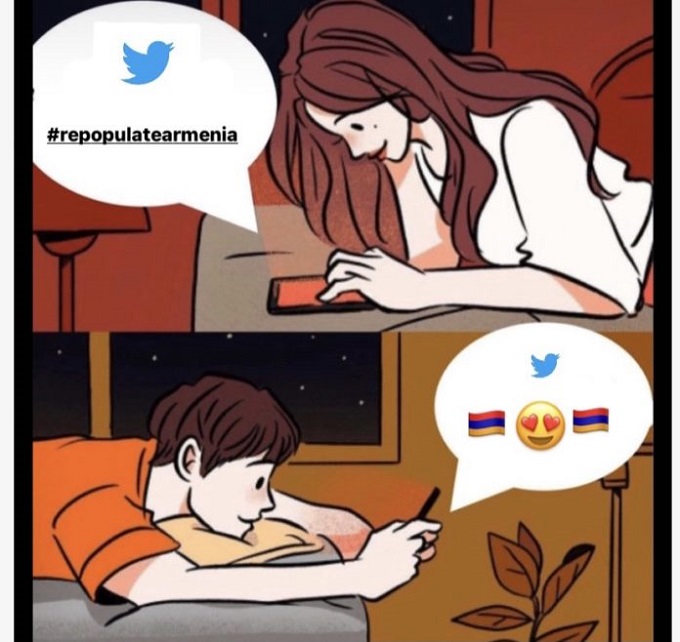By Ani Tatintsyan
Special to The Armenian Mirror-Spectator
From the early days of the Artsakh war, Armenian youth in Armenia and the diaspora had begun flooding the newsfeed on Twitter (or as some call it, “Armo Twitter”) with talk of repopulation. Amongst the shock, grief, and confusion, there it was: a plan, a way through. Although the tweets were meant to be seen in amusing and entertaining light, it was starting to become clear that there was a portion of the Armenian population (mostly Millennials and Gen Z), helping spread enthusiasm about the potential of having large families and repopulating Armenia.
Read also
Of course, one can begin by asking what they’re planning to repopulate: Armenia the country? Armenia the diaspora? This is an important question to ask but one I will not be exploring at this time. Although the nature of the tweets, and the format of Twitter itself, could be dismissed as a mere joke, other questions arise, ones that I do intend to explore: What is the meaning of these jokes? Where do these jokes come from? In other words, what’s the theory behind the impulse? As a perpetual student of philosophy, I can’t help but look for theoretical answers to fundamental questions. My search delivered results. The answer was Eros.
According to Greek mythology, Eros was the god of love and sex. In Beyond the Pleasure Principle, Sigmund Freud refers to the concept of Eros as the will to live, “the instinct of self-preservation.” This kind of instinct has always been present within Armenian communities. Armenians tend to put much value on family and an emphasis on continuing the traditions of those who came before them. This tendency of “self-preservation” is partly due to the years of existential threat we have faced. This year, that threat, already genetically ingrained in us, once again became real, and so this “will to live” intensified.
Alex, 24-years old, who is active on Armenian Twitter, said, “The whole repopulation meme started [as] a lot of Armenians were socializing together online due to the war,” but he makes a point to say that there is definitely an air of seriousness to the jokes. Shirak, 27, agrees that the repopulation discourse is a form of defense. “I think people finally realized the threat [of extinction] is real, hence the jokes, but I think there is something more primal to it as well.” This survival instinct has always been present within our people, and within people whose ancestors have survived existential threats and annihilation. Arax, 21, said, “I think the concept of repopulation initially was a way to boost our morale, especially the diaspora who felt so detached and useless. We lost so many young men and women that we all talked about repopulating to remind ourselves that we’ll get through this and through repopulation we’ll ensure our survival.”
-So you’re telling me Twitter’s new fleet feature has nothing to do with helping Armenians repopulate Armenia?
According to Greek mythology, Eros was the god of love and sex. In Beyond the Pleasure Principle, Sigmund Freud refers to the concept of Eros as the will to live, “the instinct of self-preservation.” This kind of instinct has always been present within Armenian communities. Armenians tend to put much value on family and an emphasis on continuing the traditions of those who came before them. This tendency of “self-preservation” is partly due to the years of existential threat we have faced. This year, that threat, already genetically ingrained in us, once again became real, and so this “will to live” intensified.
Alex, 24-years old, who is active on Armenian Twitter, said, “The whole repopulation meme started [as] a lot of Armenians were socializing together online due to the war,” but he makes a point to say that there is definitely an air of seriousness to the jokes. Shirak, 27, agrees that the repopulation discourse is a form of defense. “I think people finally realized the threat [of extinction] is real, hence the jokes, but I think there is something more primal to it as well.” This survival instinct has always been present within our people, and within people whose ancestors have survived existential threats and annihilation. Arax, 21, said, “I think the concept of repopulation initially was a way to boost our morale, especially the diaspora who felt so detached and useless. We lost so many young men and women that we all talked about repopulating to remind ourselves that we’ll get through this and through repopulation we’ll ensure our survival.”
-So you’re telling me Twitter’s new fleet feature has nothing to do with helping Armenians repopulate Armenia?
Freud’s Beyond the Pleasure Principle was a seminal work in psychoanalysis. He argued there are two forces that govern our lives: Eros and the death instinct. The effects of World War I would influence his ideas in creating the death drive theory, as the horrors of the time showed that man was capable of destruction just as much as creativity. “Besides repopulation [serving] as a defense instinct, I think it’s a form of defiance,” Arax said. If we were to attribute the repopulation conversation to the psychoanalytic theories of Eros, then it is safe to say that it reacts to the destruction of its counterpart, the death drive. Both drives inevitably influence one another, and Eros, according to Freud, “makes an effort to assert itself in the struggle” – what better protest than the will to live.
Plato talks about Eros in The Symposium. In the famous text, the character Diotima’s speech describes Eros as connected to the truth and the divine. Eros becomes the last stage of eternal contemplation where creativity takes place. In Plato’s text, Eros is a universal force that moves all things towards peace, perfection, and divinity. Having seen so much horror, the Armenian people have preached the value of preservation for centuries. “Armenians have experienced so much pain, tragedy, and loss, the fact that we’re still here and we’re actively aware of our culture is a privilege and so many of us understand that and want to contribute in continuing that,” Arax said.
One of the criticisms about the repopulation discourse is that it’s exclusionary. Not everyone can nor wants to have children. This is a fair argument but what if we thought about this call for repopulation not just in terms of human bodies? In Wounded Heroes: Vulnerability as a Virtue in Ancient Greek Literature and Philosophy, Marina Berzins McCoy writes about Eros and its affinity for reproduction, but she argues that this applies to all aspects of creation. She writes, “Reproduction in not only a physical, but also intellectual and creative sense, is part of the human response to our own need and lack, as we strive for but cannot yet reach the eternal.” Perhaps this talk of repopulation extends beyond just the human factor, and touches on something about the continued production of culture, especially at a time where many of our monuments and places of worship are being destroyed as a result of the transfer of land. Arpine, 20, said that the lack of compassion from the rest of the world made her see how alone Armenians were, “it made me realize no one will be there for us but us and the only way to be able to stay away from extinction is to have a huge, powerful future generation that doesn’t allow the world to forget us.”
In The Four Loves, C.S. Lewis writes, “Eros wants the beloved” and it is “ready for every sacrifice except renunciation.” Perhaps the beloved in the case of Armenian youth is not so much one other as it is the nation and culture itself. “Repopulating makes up for the lost lives and ensures that no matter what hatred is thrown at our people, we will be able to overcome,” said Arpine.
The final piece in William Saroyan’s collection of short stories, Inhale & Exhale, is called “The Armenian and the Armenian.” In it he writes: “Go ahead, destroy this race. Let us say that it is again 1915. There is war in the world. Destroy Armenia. See if you can do it. Send them from their homes into the desert. Let them have neither bread nor water. Burn their houses and their churches. See if they will not live again. See if they will not laugh again. See if the race will not live again when two of them meet in a beer parlor, twenty years after, and laugh, and speak in their tongue.”
Although he never actually wrote “see if they will not create a new Armenia,” (this is a popular misquotation), in a way this is implied by Saroyan’s emphasis on the continued existence of the Armenian race. With this passage, I like to think Saroyan was invoking Eros as well.
In the face of annihilation, violence, and destruction; Armenian people strive to create the new on a foundation of the old. Standing on the pedestal of ancestral wisdom, our people keep going. This is the way that we know how to survive. Saroyan’s famous quote is prescient here. Armenians’ defense against destruction comes from their unions as well as their creative and productive ambitions. We know all too well the real fears of extermination, and through these seemingly youthful “jokes,” we see something very real for our communities: the belief that our ultimate victory lies in our continued existence.

Ani Tatintsyan, born in Goris, Armenia, is a Los Angeles-based writer and filmmaker. She is the author of two books of poetry, Letters to Strangers (2013) and Everything is Magic (2016). She holds a B.A. in Political Science and English Literature from the University of Southern California and a graduate degree in Aesthetics and Politics from California Institute of the Arts. She writes about politics, popular culture, and philosophy. You can follow her on Twitter.

























































